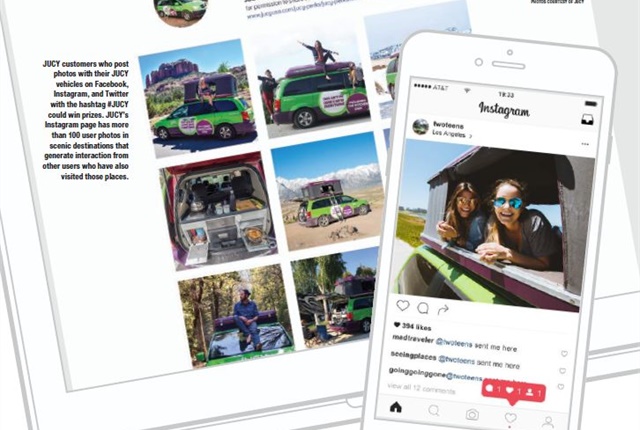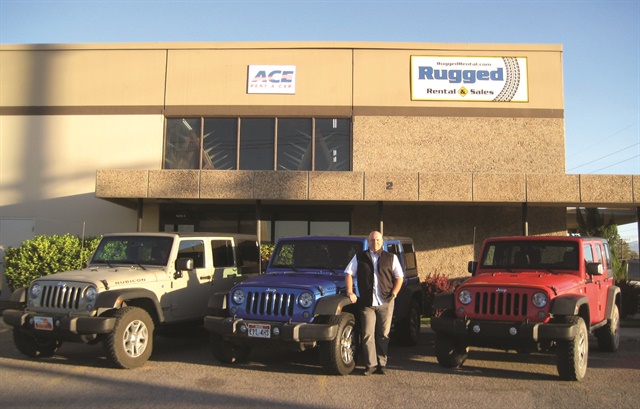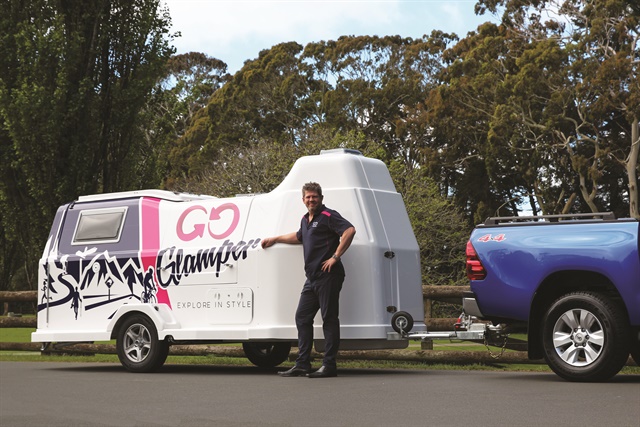How to Capture Millennial Renters
Millennials have grown up in a world of rapid technological advances and an expectation of instant gratification. Their travel habits have evolved as well, affected by increasing urbanization, decreasing car ownership, and an openness to multimodal transportation. Car rental is one of those options — but how do you get millennials excited about renting a car and build loyalty with them?
Ken Stellon, executive vice president and partner at Frontline Performance Group, advises car rental operators to reach out to younger millennials — even renters younger than 25.
“If car rental firms opened their minds to being accommodating to renters aged 20 to 25, it could lead to a new opportunity for them,” says Stellon. “Car rental operators should avoid the mindset that renting to under 25-year-old customers is an opportunity to secure more underage fees; don’t hold them hostage to the admin fee.”
Utah-based Rugged Rental’s minimum age to rent is 21 and there is no extra surcharge.
“Renting to younger drivers opens our company to a bigger audience,” says Chad Knavel, vice president and general manager of Rugged Rental. “But it’s also a bigger risk. Our company has policies and procedures to try to mitigate it.”
Ric Militi, CEO of InnoVision Marketing, recommends leading with experience, not just the product. “The experience is being outdoors and having fun; renting a car could add to that experience,” he says.
When making a marketing plan, social media should be a component. According to the Pew Research Center, 90% of young adults (ages 18 to 29) use social media. And a third of millennials say social media is one of their preferred channels for communicating with businesses.
Social media isn’t the only marketing method for rental companies to connect with millennials. We talked to several rental car operators to find out how they are reaching out to the younger generation.
Offer Niche Products
Stellon recommends providing younger customers with vehicles at both ends of the spectrum — from fuel-efficient smaller cars to higher end or “unique experience” vehicles that may be out of their purchase price range.
Rugged Rental specializes in renting “tough” vehicles: trucks, four-wheel-drive vehicles, and vehicles for towing. The company also rents popular but higher-end vehicles including the Jeep Wrangler, Jeep Cherokee, and Dodge Charger.
“Our vehicles appeal to renters who like the outdoors,” says Knavel. “We also tend to get younger renters who can’t afford to buy a vehicle like the Jeep Wrangler, so it makes sense for them to rent it.”
Rugged Rental allows towing with its tow-rated vehicles, says Knavel. To help set up a better experience, the company also provides accessories such as a bike or ski racks, coolers, and camp stoves.
Midway Car Rental offers a variety of luxury and sports cars with add-ons.
“Car rental is not that sexy to a younger generation,” says Ryan Kerzner, Midway Car Rental’s managing director of sales. “We’re trying to make car rental sexy again. Our Escalades have entertainment systems and we order them with nicer wheels. Our Mustang coupes come with racing stripes.”
JUCY rents a recreational vehicle converted from a minivan. “Compared to other generations, millennials would rather pay less for a plane ticket or hotel and splurge on the experience,” says Hiron Menon, general manager at JUCY RV Rentals. “JUCY helps with that by providing a place to stay in the vehicle.”
JUCY’s mini RV can also appeal to a younger audience because it’s less intimidating to drive than a larger RV, according to Menon. “Our main goal is to show people that our mini RVs drive more like a car but can still sleep four,” he says.
GO Rentals in New Zealand recently added a specialty item to its fleet lineup. The Glamper is a camper trailer that includes a truck to tow it.
This fully sustainable unit runs on solar power and contains features such as a private toilet cubicle, folding internal table, gas cooker, kitchen unit, compact fridge, and bedding for two, along with camping accessories.
James Dalglish, general manager at GO Rentals, says that the Glampers are currently available for rent at its locations in Auckland and Christchurch.
“We are starting with 20 Glampers,” he says. “Based on positive feedback from a customer interest survey, we believe we’ll be adding more to the fleet.”
Create an Experience
To create the ultimate experience package, JUCY has formed partnerships with groups that target the younger generation. JUCY recently partnered with FestEvo, a membership program for music festival goers.
“As a preferred vendor, we are offering discounts for those who rent our vehicles through FestEvo,” says Menon. “Members will see the promo code on the FestEvo website.”
JUCY also partners on discounts for excursions and activities such as helicopter rides, whitewater rafting, and escape rooms, as well as discounts for national parks and RV campgrounds.
An idea still in the works involves partnering with a website called Hipcamp. Similar to the Airbnb concept, Hipcamp allows people to rent their land for others to stay and camp. According to Menon, the idea is to rent more vans during the winter season, the slower season.
“For example, we could rent land in Big Bear during the ski season,” says Menon. “We would park our RVs there and have someone maintain them. The vans wouldn’t be on the road; we would rent them on the land on a per-night basis.”
JUCY is also looking to promote its vehicles on college campuses.
Stay Engaged on Social
Creating the right experience extends to social media.
“If you go on someone’s Facebook page and post a rental car ad, it will be ignored,” Militi says. “But if you find a social media group where people are interested in camping and outdoor experiences, then you can create an ad that’s about a beautiful drive, and nothing adds to that experience like driving a convertible or Jeep.”
GO Rentals saw an opportunity to create a social media page based on travel. “We focused on growing a good following of people interested in traveling to New Zealand,” says Dalglish. “The page doesn’t focus on GO Rentals. We will occasionally put GO Rentals deals on the page, but it’s predominantly a travel page.”
Dalglish refers to Go Explore New Zealand as a virtual road trip with articles, photos, and videos of various destinations and activities across New Zealand. Dalglish says that his team regularly interacts with its social media audience; they help determine what content will be featured next.
“There has been a huge amount of organic growth,” he says. “Go Explore New Zealand is currently the fourth largest social media page for travel in New Zealand.”
JUCY customers who post photos with their JUCY vehicles on their Facebook, Instagram, and Twitter pages with the hashtag #JUCY could win prizes, according to Menon.
For smaller operators, using a social media influencer can make a difference. “Influencers can create hype around events, bring attention to special discounts or programs, and increase awareness of your brand,” says Nima Mobasser, vice president of State Van Rental.
JUCY has a public relations team that helps connect the company with social media influencers who have big millennial followings. “We give these influencers JUCY vehicles and they will post about their experiences,” says Menon.
Jordi Rivero, chief product officer at Mex Rent A Car, emphasizes the importance of providing feedback and answering any questions on your social media pages.
“Some companies don’t provide a response to questions on their social media page,” he says. “You need a social media manager or an employee to respond to a social media user’s question or comment within 24 hours.”
Streamline the Process
Technology has streamlined processes in all types of transactions and has fueled millennials’ need for instant gratification. In car rental, that means no patience for a clunky process with long wait times.
“The way to approach customers and deliver a vehicle and services are changing,” Rivero says. “We need to adapt to a hybrid car-sharing and ride-hailing model to compete.”
This transition entails a mobile-focused rental process and expanded access.
“I have experienced millennials that want as little human interaction as possible,” says Mobasser. “This means the more the rental process can be handled by mobile, the more pleasing to millennials. Hence, integration of mobile and app modules into operations would cater to a younger audience.”
All rental companies need to create a mobile-enabled website, but it depends on the company whether a mobile app is necessary.
State Van Rental has mobile-enabled versions of its websites, but based on its niche product and the small size of the company, it didn’t seem justified getting a mobile app, according to Mobasser.
Mex Rent A Car is developing a mobile app that streamlines the car rental experience.
“Customers at our airport locations in Mexico will be able to reserve vehicles through the app by the hour or the day,” says Rivero. “Once they arrive at the airport, they can open the car and start it with the Mex app. Currently, we are testing the app with friends and family to get their feedback.”
GO Rentals continues to expand features on its app. In addition to booking a rental car, customers can build their profile within the app so they don’t have to enter the same information next time. Customers can check in on their phone and save time at the counter by gaining access to its “GO fast” lane when they get to the office.
The newest feature is the ability to order a shuttle. Once a shuttle is requested, a message is sent to the driver, says Dalglish. It will tell the customer the shuttle’s expected time of arrival through real-time updates.
“After research, we knew that it was a frustration for clients to wait for shuttles at the airport,” says Dalglish.
“We hope that this will improve this service and make it better.”
To make it more convenient for its younger customers, JUCY offers 24/7 service. Customers can pick up or drop off the RV rental at any time of the day and night.
“Millennials like the convenience factor,” says Menon. “They are OK if an employee isn’t there when they return or pick up the vehicle. We leave them instructions on the vehicle and how to access the key in the drop box.”
Additionally, JUCY now offers a drop-off and delivery service within a 50-mile radius. When customers land at the airport, Menon says that a JUCY employee will deliver the vehicle to them.
“If a customer lands at the airport, he or she would have to take an Uber or taxi to get to our office,” says Menon. “We don’t want customers to have to worry about finding transportation to our office.”
Fonte: Auto Rental News




